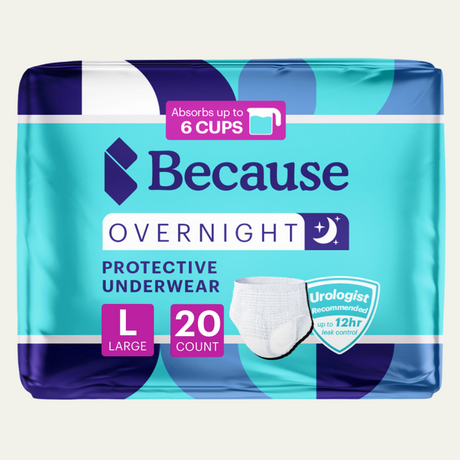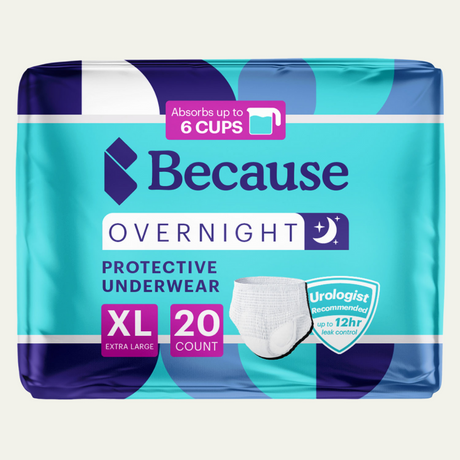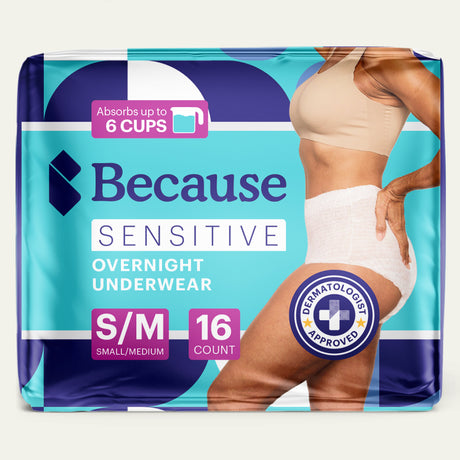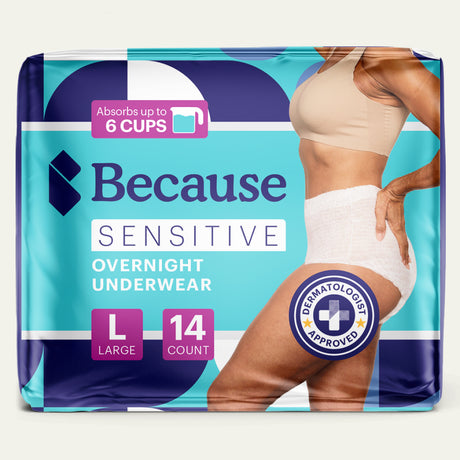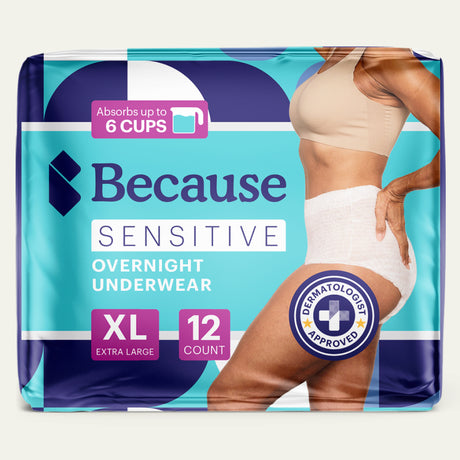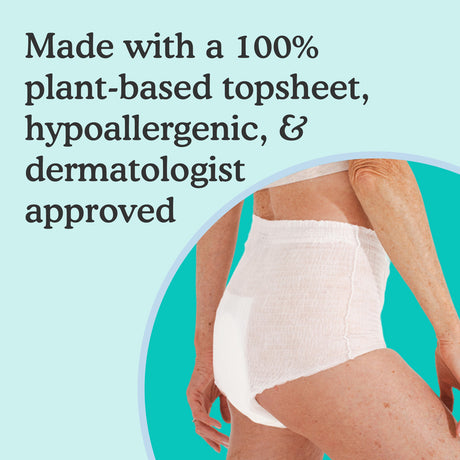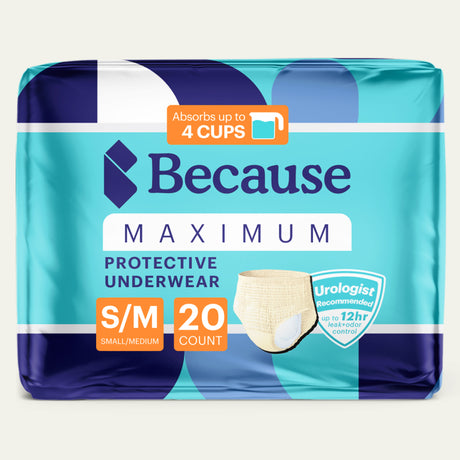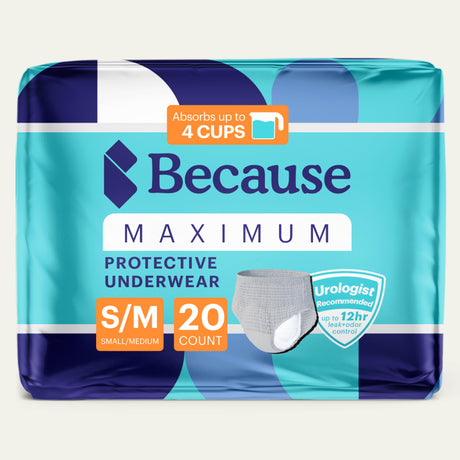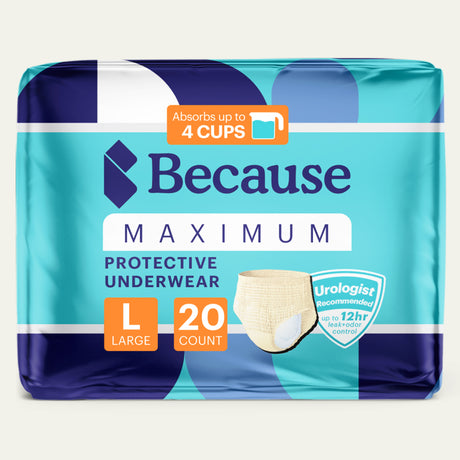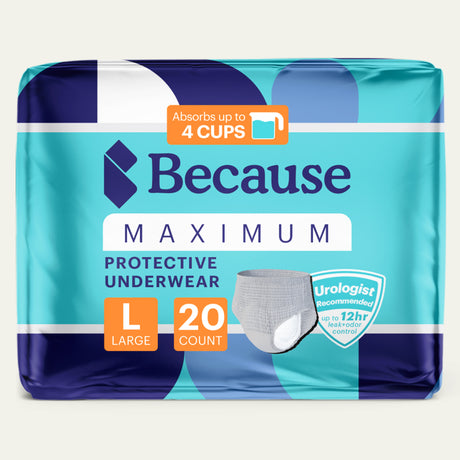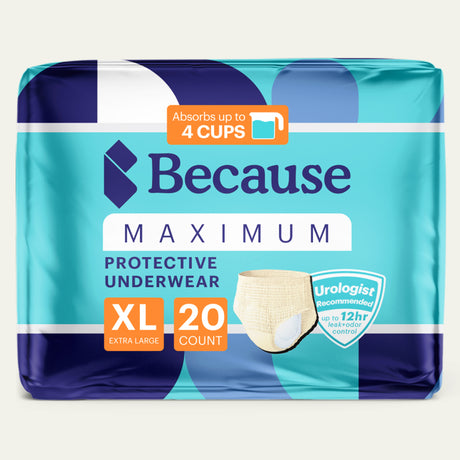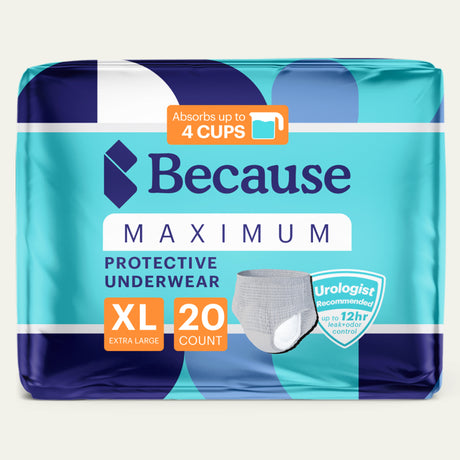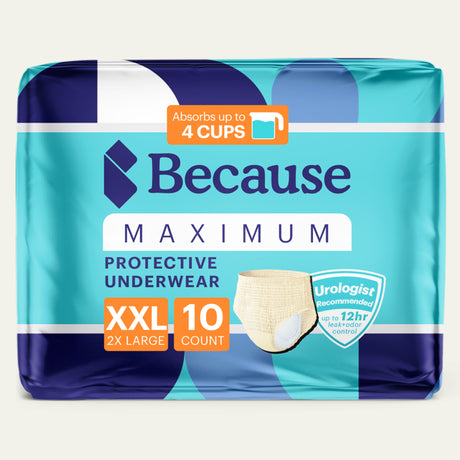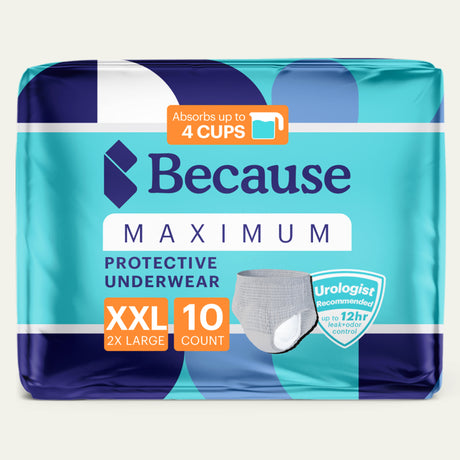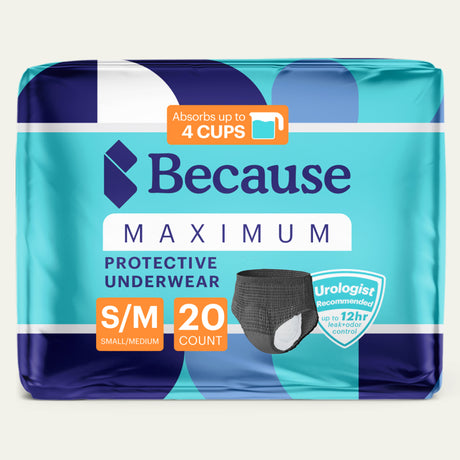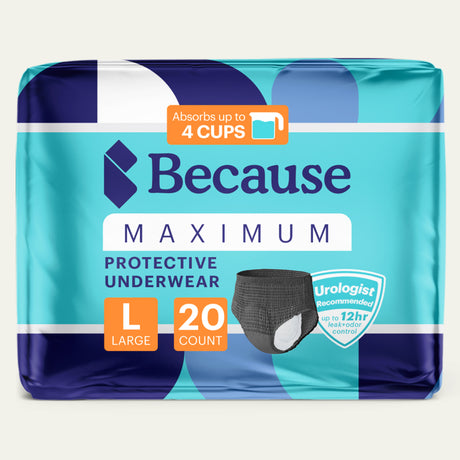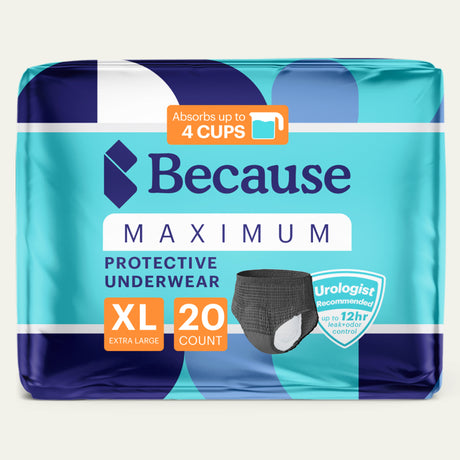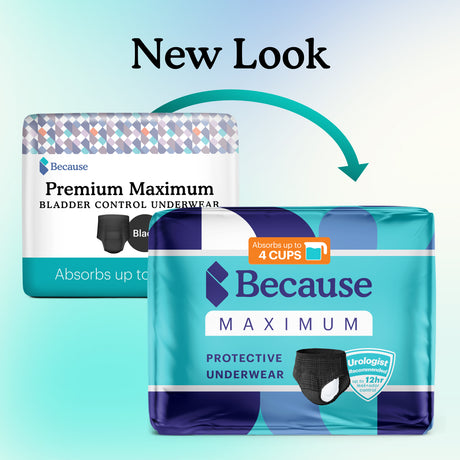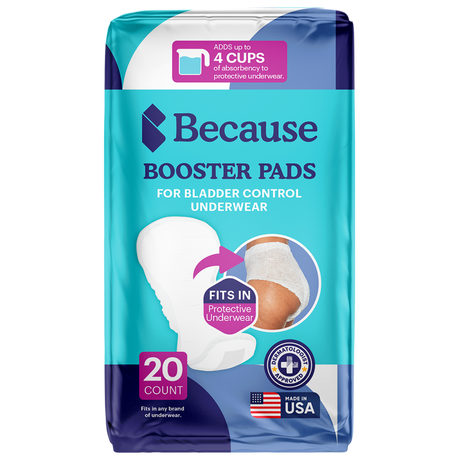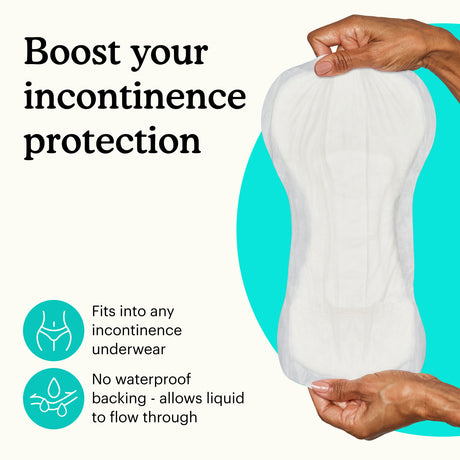An estimated 13 million Americans have “urinary incontinence,” an umbrella term for medical conditions that result in an involuntary loss of urine. Some types of urinary incontinence, like overactive bladder and stress incontinence, are widely known. But there are other less common forms of bladder control problems that you may not be as familiar with.
Reflex incontinence is an example of a type of incontinence that is not widely discussed. In this post, we’ll provide information about what it is, what causes it, and what you can do about it.

What is Reflex Incontinence?
Reflex urinary incontinence is when a person experiences a sudden loss of urine without warning. It happens due to the activities of the detrusor muscle of the bladder.
Ordinarily, the bladder muscle contracts to release urine when it receives signals from the brain that you’re at the toilet and ready to urinate. Those signals travel along the spinal cord and then get transmitted through the lower body to the bladder.
Men and women with reflex incontinence suffer from detrusor overactivity, meaning that the muscle contracts at other times as well. When it does, urine can escape the bladder and leak out through the urethra. Usually, problems with the transmission of messages along the spinal cord are responsible for reflex urinary incontinence. As a result, healthcare providers sometimes refer to it as spinal or supraspinal reflex incontinence.
Causes of Reflex Incontinence
As previously mentioned, reflex incontinence occurs due to involuntary bladder contractions. This abnormal detrusor muscle contraction activity can occur for a variety of reasons. Let’s explore some of the common causes of reflex urinary incontinence.
Neurological and Congenital Conditions
Most often, problems with the nervous system lead to reflex incontinence. When nerve damage occurs, signals from the brain may not properly travel along the spinal cord, or they may get distributed from the spinal cord to the bladder in an abnormal manner. Some conditions and physical disabilities that can result in reflex incontinence include:
- Memory and psychiatric disorders like dementia and Alzheimer’s disease
- Multiple sclerosis
- Parkinson’s disease
- Spinal cord injury
- Stroke
- Severe nerve damage due to diabetes, an episode of extremely high blood pressure, or another condition
Some health conditions that cause nervous system dysfunction and reflex incontinence are congenital, meaning that they are present at birth. Examples include:
- Neural tube defects
- Cerebral palsy
- Muscular dystrophy
Infections and Inflammation
In some cases, reflex incontinence may be a temporary problem, occurring when something causes the bladder to become inflamed. The inflammation can impact the activity of the bladder muscles, resulting in urine leakage. Inflammation may occur due to:
- Urinary tract infections that impact the kidneys or the lower urinary tract
- Radiation therapy on the lower abdomen
- Some medications, especially those used to treat prostate cancer and other forms of cancer
- Kidney stones
- Benign prostatic hyperplasia, commonly referred to as enlarged prostate
- Sensitivity to foods and drinks like caffeine and spicy foods
- Urinary retention, which is an inability to fully empty the bladder due to a blockage, a medical condition, or physical problems
Age-Related Changes
People of all ages can experience reflex incontinence, but the prevalence of urinary incontinence is generally greater among the elderly. As we age, we naturally lose some of the cells in our brains and spinal cords. In some older adults, this can negatively impact the urinary system and lead to urine leakage, bedwetting, and other incontinence symptoms.
Older individuals are more at risk for many of the problems with the nerves that lead to reflex incontinence, such as dementia. Plus, the pelvic floor muscles that support the bladder often grow weaker with age, making urine leakage more likely to occur in response to abdominal pressure during intense physical activity, sneezing, coughing, and laughing.
Common Symptoms of Reflex Incontinence
The main symptom of reflex incontinence is urine leakage without warning. People with reflex urinary incontinence don’t experience an urgent need to urinate ahead of time. The release of urine simply happens in response to a sudden muscle contraction.
The severity of the leakage depends on how full the bladder is. Sometimes, it may be very light, while other times, a person may pass large amounts of urine unintentionally. Regardless of how severe symptoms are, reflex incontinence can lower a person’s quality of life, as worries about leaks occurring at the wrong time can make people hesitant to leave home.

Diagnosing Reflex Incontinence
To diagnose reflex incontinence, health care professionals will typically first gather the medical history of patients and then ask probing questions to explore the nature of their symptoms. Since there are many types of incontinence, a physician needs to know as much as possible about what a person is experiencing to differentiate one form from another. Some ways that reflex incontinence can differ from the main types of incontinence include:
- No sudden urge to urinate, like there is with urge incontinence
- Urine leakage happening at random times, rather than always in response to abdominal pressure as is typically the case with stress incontinence
- No difficulty intentionally passing urine, like there usually is with overflow incontinence
- Accidents happening without any physical disability or lack of mobility that makes it hard to reach the bathroom in time, as is common with functional incontinence
Since people with reflex incontinence often have an underlying medical condition, a doctor may only need to do a physical examination and patient interview to diagnose the condition. In other cases, physicians may order a blood test, urine test, and imaging tests like MRIs or CT scans to gather more information before making a diagnosis.

Treatment Options for Reflex Incontinence
Although reflex incontinence is a less common type of urinary incontinence, there are ways to address the problem. Some medical treatment options include the following.
Medications
Medication is a common treatment for reflex incontinence. Doctors may prescribe drugs that are also used to treat urge incontinence, such as:
- Botox injections
- Darifenacin
- Dicyclomine
- Fesoterodine
- Hyoscyamine
- Imipramine
- Mirabegron
- Oxybutynin
- Solifenacin
- Tolterodine
- Trospium
- Vibregon
These drugs generally work by relaxing the bladder muscle or reducing bladder muscle contractions. When a nervous system disorder is the cause of reflex incontinence, doctors may prescribe additional drugs to help manage the underlying condition.
Clinical Interventions
In some cases, surgical procedures may be performed to increase support for the bladder, reduce pressure on the bladder, or address an underlying physical problem that is contributing to reflex urinary incontinence.
Doctors may also recommend sacral nerve stimulation, a procedure where a small device is implanted at the base of the spine and used to electrically stimulate the nerves in the lower abdomen. The stimulation may reduce bladder contractions in some people.
The installation of an artificial urinary sphincter or urinary cuff is another surgical treatment that may benefit people with reflex incontinence, but is typically only recommended as a last resort when other treatments aren’t enough to reduce leakage. The cuff keeps the urethral sphincter, the muscle that opens to release urine, closed. When a person is ready to urinate, they press on a pump implanted in their private area to open the cuff.
Behavioral and Lifestyle Changes
If you have reflex incontinence, your medical provider may recommend that you make changes to your daily routine and lifestyle, such as:
- Perform pelvic muscle exercises to strengthen your pelvic floor and better support your bladder
- Keep a food diary and avoid foods and beverages that cause bladder irritation
- Try Bladder training by urinating regularly according to a set schedule every day
- Eat a healthy diet and control portion size to reach or maintain a healthy weight, as excess body fat raises the risk of incontinence
- Increase your intake of fiber to promote bowel regularity, because fecal impaction due to constipation can worsen incontinence
Managing the Symptoms of Reflex Incontinence
Those who frequently experience a loss of bladder control due to reflex incontinence can better manage symptoms with proper self-care and the use of incontinence care and urinary health products. Here are some things you can do to potentially improve your quality of life if you have the condition.
Use Bladder Protection Products
Bladder protection products like pads and incontinence underwear can help you stay dry when urine leakage occurs, reducing concern about leaving your house and sleeping through the night. People with severe reflex incontinence may need to use the most absorbent bladder control products possible, such as Because overnight absorbency options. Booster pads can be used to increase the absorbency even more. For those who experience milder symptoms, moderate or maximum absorbency products may be sufficient.
Practice Incontinence Hygiene
Proper hygiene can reduce the risk of skin irritation and body odors associated with reflex incontinence. An incontinence hygiene regimen should include:
- Changing incontinence protection as soon as possible after an accident occurs
- Using a no-rinse cleansing spray or cleansing wipes to thoroughly clean your private area when you change your pad or incontinence underwear
- Applying barrier cream to your skin to protect it from moisture
- Placing used incontinence protection products in disposal bags before throwing them away
- Washing your hands before and after you change your incontinence protection
Consider Supplements to Support Bladder Health
Bladder health supplements may help support bladder function and overall urinary health. Featuring pumpkin seed and soybean germ, Because Bladder Control Daily Supplements promote a stronger bladder to reduce the risk of urine leakage. Your health care provider can help you determine if a supplement or other natural remedies for incontinence are right for you.

Support Resources for Those with Reflex Incontinence
If you or a loved one has reflex incontinence, you’re not alone. There are resources available to assist you. Some national organizations that may be able to help include:
- Simon Foundation for Incontinence
- National Association for Incontinence
- National Multiple Sclerosis Society
- United Spinal Association
- Alzheimer’s Association
- Parkinson’s Foundation
Your healthcare provider is also an important source of support. The information outlined in this guide is not intended to substitute for medical advice, so talk to your doctor about your symptoms. Partnering with your medical provider will help you determine the best way to address and manage reflex urinary incontinence.
Do you or a loved one suffer from reflex incontinence? Take our bladder protection quiz and get a sample pack to try.
If you're struggling with incontinence, join one of our private support groups today!
Women's Incontinence Support Group
Men's Incontinence Support Group
Source:
llinois Department of Public Health. (n.d.). Incarcerated women. Retrieved from http://www.idph.state.il.us/about/womenshealth/factsheets/inc.htm



